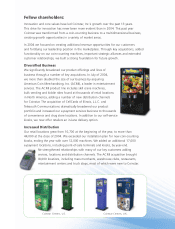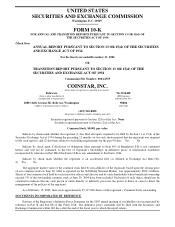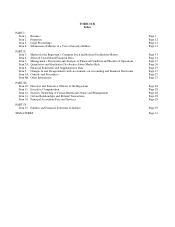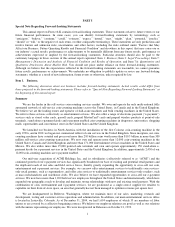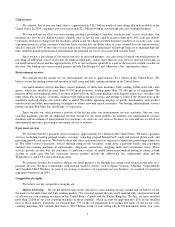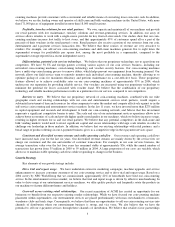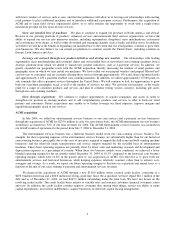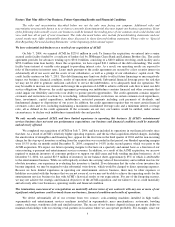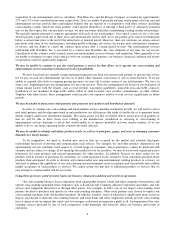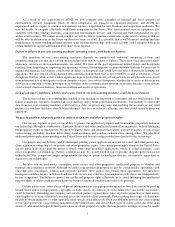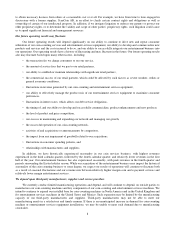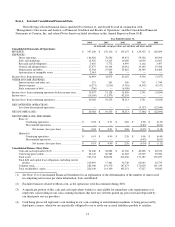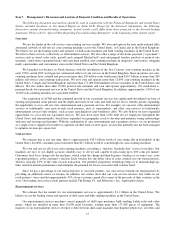Redbox 2004 Annual Report Download - page 9
Download and view the complete annual report
Please find page 9 of the 2004 Redbox annual report below. You can navigate through the pages in the report by either clicking on the pages listed below, or by using the keyword search tool below to find specific information within the annual report.5
Factors That May Affect Our Business, Future Operating Results and Financial Condition
The risks and uncertainties described below are not the only ones facing our company. Additional risks and
uncertainties not presently known to us or that we currently deem immaterial also may impair our business operations. If any
of the following risks actually occur, our business could be harmed, the trading price of our common stock could decline and
you could lose all or part of your investment. The risks discussed below also include forward-looking statements and our
actual results may differ substantially from those discussed in those forward-looking statements. Please refer to “Special
Note Regarding Forward-Looking Statements” at the beginning of this annual report.
We have substantial indebtedness as a result of our acquisition of ACMI.
On July 7, 2004, we acquired ACMI for $235.0 million in cash. To finance the acquisition, we entered into a senior
secured credit facility funded by a syndicate of lenders led by JPMorgan Chase Bank and Lehman Brothers Inc. The credit
agreement provides for advances totaling up to $310.0 million, consisting of a $60.0 million revolving credit facility and a
$250.0 million term loan facility. Since this acquisition, we have repaid $42.1 million of the debt outstanding. The credit
facility bears interest at variable rates pegged to prevailing interest rates. As a result, our operating results are exposed to
risks of fluctuations in interest rates. Loans made pursuant to the credit agreement are secured by a first security interest in
substantially all of our assets and the assets of our subsidiaries, as well as a pledge of our subsidiaries’ capital stock. The
credit facility matures on July 7, 2011. This debt financing may limit our ability to effect future financings or may negatively
impact our business, financial condition, results of operations and growth. Substantial financial leverage poses the risk that
we may not be able to generate sufficient cash flow to service the indebtedness, or to adequately fund our operations. We
may be unable to increase our revenue and leverage the acquisition of ACMI to achieve sufficient cash flow to meet our debt
service obligations. Moreover, the credit agreement governing our indebtedness contains financial and other covenants that
could impair our flexibility and restrict our ability to pursue growth opportunities. The credit agreement contains negative
covenants and restrictions on actions by us including, without limitation, restrictions on certain common stock repurchases,
liens, investments, capital expenditures, indebtedness, restricted payments including cash payments of dividends, and
fundamental changes or dispositions of our assets. In addition, the credit agreement requires that we meet certain financial
covenants, ratios and tests, including maintaining a maximum consolidated leverage ratio and a minimum interest coverage
ratio, all as defined in the credit agreement. If the covenants are not met, our lenders would be entitled, under certain
circumstances, to declare such indebtedness immediately due and payable.
We only recently acquired ACMI, and have limited experience in operating this business. If ACMI’s entertainment
services business does not meet our performance expectations, our business and financial condition could be materially
and adversely affected.
We completed our acquisition of ACMI on July 7, 2004, and have included its operations in our financial results since
that date. As a result of ACMI’s relatively higher operating expenses, and the fact that acquisition-related charges, including
the amortization of intangibles and financing fees, appear for the first time in the third quarter of 2004 and the non-recurring
charge for the step-up of inventory resulting from the acquisition was recorded in that period, our blended operating margins
were 10.5% in the six months ended December 31, 2004, compared to 14.8% in the second quarter, which was prior to the
ACMI acquisition. We expect our future operating margins to fluctuate on a quarterly and annual basis as a function of our
coin-counting, e-payment and entertainment services revenues. In addition, as a result of the ACMI acquisition, we are now
required to maintain inventory of consumer products to support our skill-crane and bulk vending machine businesses. As of
December 31, 2004, we carried $25.9 million of inventory on our balance sheet, approximately 85% of which is attributable
to the entertainment business. While we will regularly evaluate the carrying value of this inventory and establish reserves for
obsolete inventory, our experience in evaluating this inventory is limited. If we determine that the value of our inventory has
become impaired, we may be required to take substantial write-downs, which would be charged to direct operating expenses.
Because we have limited experience in operating our entertainment services business, there may be other expenses or
liabilities associated with this business that we are not aware of, or we may not be able to achieve the operating results for the
entertainment services business in line with ACMI’s historical results or our expectations. For any of the foregoing reasons,
we may not achieve the strategic and financial objectives of the ACMI acquisition, and our failure to do so could materially
and adversely affect our businesses, operating results and financial condition.
The termination, non-renewal or renegotiation on materially adverse terms of our contracts with any one or more of our
significant retail partners could seriously harm our business, financial condition and results of operations.
We derive substantially all of our revenue from two sources: coin-counting machines installed in high traffic
supermarkets and entertainment services machines installed in supermarkets, mass merchandisers, restaurants, bowling
centers, truckstops, warehouse clubs and similar locations. The success of our business depends in large part on our ability to
maintain relationships with our existing retail partners in locations where we can operate profitably. For example, since our


